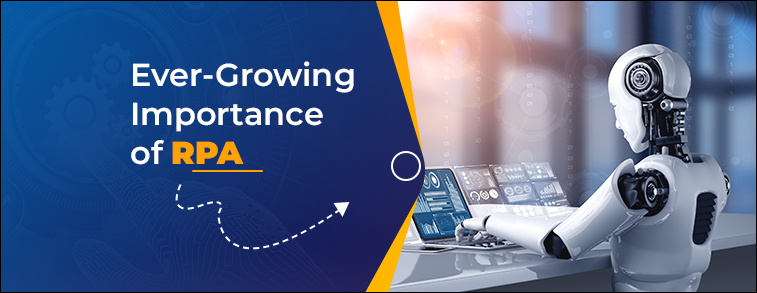The Rise of RPA: How Robotic Process Automation is Revolutionizing Business


The Rise of RPA: How Robotic Process Automation is Revolutionizing Business

A few years back, COO of a large organization during a candid discussion bemoaned that the prime issue with his enterprise operations is that it still runs most of the business processes the same way as they did 20+ years back. Along the way somewhere, offshoring/ outsourcing models were introduced he added. Digital technologies were pressed in for enabling exactly similar processes to be incrementally faster & cheaper. Thus, there has not been much of a ground-breaking transformation in the key areas of customer service, marketing, finance, HR and supply chain & vendor/ supplier management.
Interestingly, the concerns raised by the COO are relevant with a varying degree to other small and medium size organizations as well. Additionally, recent pandemic has forced organizations to rethink about a need to have ‘Disaster-ready’ business processes and a more flexible capacity to be in place to address demands during such exigencies.
The ongoing pandemic has resulted in a need for continued rise in productivity, efficiency, and agility.
Emerging technologies like RPA (Robotic Process Automation) has helped early-mover/ adopter organizations to address some of such key issues faced by COOs/ operations managers. Application of RPA has helped such organizations, transform their processes to be more efficient, intelligent, and cost effective – thereby transforming the way work is done for mission critical processes within the organization.
Some of these organizations are successfully using RPA as a key enabler for other emerging technologies involving artificial intelligence (AI) and machine learning (ML). RPA can capture a large amount of data from different sources, that can then be applied to AI/ ML applications. Such application of RPA paves way to intelligent automation that can be used for designing and extending such intelligent automation solutions to other parts of the business.
Creating cross organization solutions RPA that leverage AI and ML capabilities, can help address some of the key concerns raised by the COO above. Intelligent RPA is set to enhance operational agility by automating business critical processes and fuel innovation by eliminating repetitive and cumbersome manpower intensive tasks. Thus, RPA is set to be an important cornerstone in most of the organization’s IT and business strategy.
Category: GenAI & Data Engineering
Recent Posts
-
GenAI & Data Engineering
From ‘Back-Office’ to ‘The Heart of the Business’
-
GenAI & Data Engineering
Aress OrderIt: Building an Intelligent Quick Commerce Delivery Platform with AI-Powered Optimization
-
24x7 Technical Support
Top 10 MSP Trends Driving Scale, Security, and Profitability in 2026
-
GenAI & Data Engineering
The 2026 Blueprint: 4 Pillars of Effective Cloud Data Management
-
Digital
Why Traditional QA Audits Fail at Scale in Contact Centers
 +91 253 6630710
+91 253 6630710 781.258.1274
781.258.1274 +44 (0) 7446 87 37 97
+44 (0) 7446 87 37 97